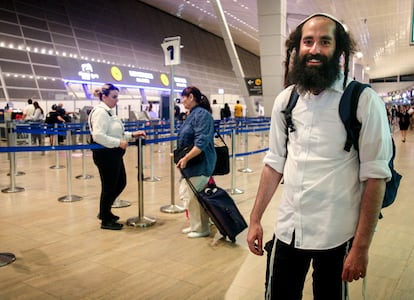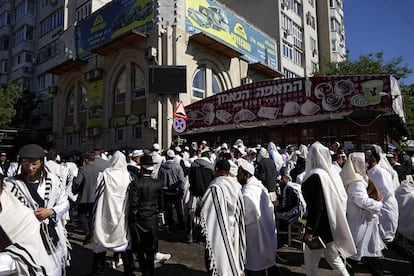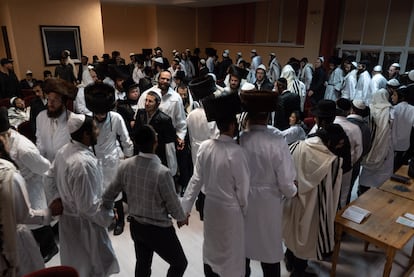God over war: Thousands of Jewish pilgrims traveling to Ukraine despite warnings
Both the Israeli and Ukrainian governments have repeatedly urged them to call off their annual trip to the tomb of Rabbi Nachman, located in the center of the country, for Rosh Hashanah

Shalev Levi fears heaven more than he fears Earth. He is a Haredi – one of the “God-fearing”, as strictly Orthodox Jews are called in Hebrew – and he has just checked in at Tel Aviv’s Ben Gurion airport, en route to Moldova, to then cross by road to Uman, in central Ukraine. There he will join more than a thousand ultra-Orthodox Jews who are already in the city to fulfill the annual tradition, started two centuries ago, of celebrating the Jewish New Year, Rosh Hashanah, at the grave of Rabbi Nachman of Breslov, the founder of the Breslov Hasidic movement. The celebration is not for another three weeks, but Levi fears that repeated calls by the Israeli and Ukrainian governments to forgo this year’s pilgrimage could turn into an outright ban at some point.
Asked if he is not afraid of going to a country at war, Levi points out that there is also a war going on in Israel, and that in any case the authority that he listens to is his rabbi, not the Israeli government. The 50 charter flights from Tel Aviv to Chisinau (the capital of Moldova) until the celebration, which begins on September 25, are already fully booked, according to Israel’s Keshet 12 TV channel. It is too soon to speculate about how many will finally make the pilgrimage, although no estimate exceeds 15,000. Other years the number is usually close to 30,000, most from Israel and, to a lesser extent, from the United States.
Levi – whose white embroidered yarmulke and wide smile reveal him to be part of the Breslov Hasidic movement founded in the 18th century by the rabbi who is buried in Uman, and to which most of those who make the pilgrimage belong – explains that more than the war, what is keeping many from going this year is the trip: an almost three-hour flight, followed by another three hours by bus to the border and then three more to Uman. “I’m flying now because I can’t risk them closing [the border],” he explains. “And the longer I wait, the more money it would cost me, and I can’t afford it. There are only seats left on flights to Romania [which also shares a border with Ukraine]. My wife is staying behind to take care of our five kids.”
Nachman, who considered it a commandment to “always be happy” (some of his followers are known for dancing a kind of religious techno-pop in the streets), asked that none of his disciples miss the meetings he organized on the occasion of the Jewish New Year. He died in 1810 without having appointed a successor, and the following year the new leader of the movement organized the first gathering before the tomb. The tradition endured (even clandestinely during Stalinism) and after the 1991 disintegration of the Soviet Union – which Ukraine was part of – the pilgrimage became a mass phenomenon that is also attended by a minority of devotees from other currents, spiritual seekers and even opportunists, some of whom commit criminal acts, explains Benjamin Brown, professor of Jewish Thought at the Hebrew University of Jerusalem. Frictions between pilgrims and locals, even fistfights, are common.

On Thursday, Israeli Prime Minister Yair Lapid called on his fellow citizens not to travel to Uman in light of the danger to life posed by entering the combat zone, according to a statement reporting a telephone conversation he held with Ukrainian President Volodymyr Zelenskiy. That same day, the Israeli Foreign Ministry issued a new travel alert (it had already issued one in February) mentioning how missiles had been fired at the Uman area just a few days earlier, killing one person and wounding several more. It also urged its citizens to leave the country immediately and stressed that Israel lacks a permanent diplomatic presence in Ukraine.
In early July, Ukraine’s ambassador to Tel Aviv, Yevgen Korniichuk, noted on Facebook that Kyiv does not allow entry “to tourists and visitors,” nor can it guarantee the safety of pilgrims. He added: “Imagine that there is a crowd of 50,000 or even more praying in Uman and [Russia] decides to fire missiles. Can you guarantee that it will not happen, after they have bombed shopping malls, kindergartens and schools?” Korniichuk even granted interviews on the subject to the strictly Orthodox press, as this group, which represents about 13% of Israel’s population, ignores the general media.
It is a feeling
Daniel Cohen claims to be unaware of the travel alert. As he prepares to check in four huge bags full of disposable plates and cutlery for a group of 120 pilgrims at Tel Aviv airport, he states that he does not have time to keep up with the news; he has more important things in his mind.
His discourse revolves around two ideas. First, while Israel is a very small country, Ukraine is so big that a war that is being waged mainly in the south and east is not even being felt in Uman. The second, more spiritual, is that this is not an act that can be explained in words; it is a feeling. To him, it is not a question of courage, but of faith.
Both among the pilgrims at the airport and at the entrance of the religious school of the Breslov community in the historic Orthodox heart of Jerusalem, the Mea Shearim neighborhood, the general feeling is one of weariness, after three consecutive years of obstacles set by earthly authorities whom they distrust. In September 2020, in the midst of a resurgence of Covid-19, Ukraine closed the border and some 2,000 pilgrims slept for days at the Belarusian border, in tents or in the open, until they lost all hope of crossing. Others tried to sneak in from Poland, Hungary or Romania. Only the 2,000 who had traveled well in advance were able to celebrate the Jewish New Year in Uman.

The following year the pilgrimage was allowed, but the return to Israel was marked by the suspicion of the health authorities that close to 200 people held false negative PCR certificates and by the images of thousands of ultra-Orthodox Jews – a group that refuses to be vaccinated – without facemasks.
When Russia invaded Ukraine last February, only a few dozen Jews stayed in Uman, and the synagogue was used as a bomb shelter. According to the Israeli press, dozens of Ukrainians descended to the mikveh, the underground ritual bath, every time the air raid sirens sounded.
Tu suscripción se está usando en otro dispositivo
¿Quieres añadir otro usuario a tu suscripción?
Si continúas leyendo en este dispositivo, no se podrá leer en el otro.
FlechaTu suscripción se está usando en otro dispositivo y solo puedes acceder a EL PAÍS desde un dispositivo a la vez.
Si quieres compartir tu cuenta, cambia tu suscripción a la modalidad Premium, así podrás añadir otro usuario. Cada uno accederá con su propia cuenta de email, lo que os permitirá personalizar vuestra experiencia en EL PAÍS.
¿Tienes una suscripción de empresa? Accede aquí para contratar más cuentas.
En el caso de no saber quién está usando tu cuenta, te recomendamos cambiar tu contraseña aquí.
Si decides continuar compartiendo tu cuenta, este mensaje se mostrará en tu dispositivo y en el de la otra persona que está usando tu cuenta de forma indefinida, afectando a tu experiencia de lectura. Puedes consultar aquí los términos y condiciones de la suscripción digital.









































